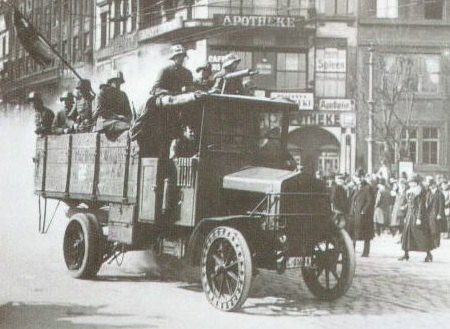General Motors Death Watch 251: Putsch Your Money Where Your Mouth Is
“G.M. is very different than Chrysler,” said Rahm Emanuel, President Obama’s chief of staff. “But I suppose the one lesson for G.M., and all the other players, is that this is a moment when a Democratic president said, ‘I am really willing to let a company dissolve, and there’s not going to be an open checkbook.’ There’s got to be real viability.” Huh? I was under the impression that this was the moment when a Democratic president said “I am NOT really willing to let a failed automaker dissolve. Uncle Sam’s checkbook is as open as a hooker’s gams. For the sake of political expediency, there’s got to be pretend viability.” Of course, it’s much worse than that. The White House has caught Detroit disease, where stupid decisions vie with no decisions for supremacy, leaving the status quo bruised and battered, but triumphant.
Like the Motown moguls that the Presidential Task Force on Autos (PTFOA) protects, all the president’s car guys’ dementia began with an idee fixee. Unlike Chrysler and GM execs, the PTFOA’s starting point had nothing to do with ensuring that they could afford to fly first class to Gleneagles for a round of golf and a hot stone massage for the Mrs. It was a simple question: “How do we save these failed companies (a.k.a. union votes)?”
At that point, the PTFOA developed a massive hardon for federal intervention that’s lasted a lot longer than four hours. Bad craziness was a given.
For example, the bureaucrats running GM’s car business—giving a thumbs-up or thumbs-down on any transaction over $10 million—swear up, down and sideways they don’t want to run a car company. PTFOA boss Steve Rattner has publicly declared that his employer will not “interfere” with GM’s decisions about brands or products. This at the same time that the PTFOA is planning to convert $22.8b of GM’s federal “loans” (so far) into a controlling stake in a newly reconstituted GM. Even The New York Times wonders WTF that’s all about.
Members of Mr. Obama’s auto task force say that even after the government owns a majority of the company, it will have no role in management. That, they say, will be farmed out to professionals, the work supervised by government-appointed members of a new G.M. board.
That doesn’t even make sense. The federal government won’t be involved in GM’s management, but the federally appointed Board of Directors will. And that’s totally different because they’ll be independent, right? Even though they’ll serve at the government’s pleasure. Anyway, I guess we can be thankful that the PTFOA has no desire to farm out GM to amateurs—although God knows I’d put my money on my fellow armchair executives before I’d “invest” a single dime on a GM suit. You know; if I had a choice.
I’m completely confused by the PTFOA’s reluctance to roll up its sleeves and tell GM how to build what for whom, where, what brand to sell it under and how to sell it. I don’t want the feds to run GM. But if they are running it—and they are—how can they do so without getting down to brand and product-related decisions?
Truth be told, the car business is about . . . wait for it . . . cars. If the feds are “protecting the taxpayers’ investment” in GM, they should start by firing all the people who had anything to do with GM’s current brand and product plans—before they make any more. How in the world does anyone expect Fritz “the Wagoner Clone” Henderson to make the correct pre- and post-bankruptcy car-related decisions when the ex-CFO has shown no ability to do so in the past?
By the same token, not firing marketing maven Mark LaNeve is proof positive that the lunatics are still running the asylum. This is the man who ran eight GM brands into the ground, destroying any and all brand equity through a massive miasma of mixed messages. I wouldn’t let LaNeve write a Craigslist ad for my minivan, never mind control a $3 billion ad budget. Why has no one rid GM of this troublesome man?
Again, I’m not in favor of Uncle Sam running GM. Clearly, they don’t have the appetite or the aptitude for the job. But as the Brits say, it’s time for the PTFOA to piss or get off the pot. Either the quango should take full responsibility for GM’s product-related plans (please, God, no) or offload this entire mess on someone else (liquidation or cough-Nissan-cough).
Either way, an immediate palace putsch would be a damn fine idea. Given that the PTFOA has already shit-canned GM’s CEO, there’s no reason to delay a more thorough housecleaning. Every day that the PTFOA allows GM’s current management to chart the automaker’s course makes reversing their lunacy more expensive. And less likely.
More by Robert Farago
Latest Car Reviews
Read moreLatest Product Reviews
Read moreRecent Comments
- Lorenzo I just noticed the 1954 Ford Customline V8 has the same exterior dimensions, but better legroom, shoulder room, hip room, a V8 engine, and a trunk lid. It sold, with Fordomatic, for $21,500, inflation adjusted.
- Lorenzo They won't be sold just in Beverly Hills - there's a Nieman-Marcus in nearly every big city. When they're finally junked, the transfer case will be first to be salvaged, since it'll be unused.
- Ltcmgm78 Just what we need to do: add more EVs that require a charging station! We own a Volt. We charge at home. We bought the Volt off-lease. We're retired and can do all our daily errands without burning any gasoline. For us this works, but we no longer have a work commute.
- Michael S6 Given the choice between the Hornet R/T and the Alfa, I'd pick an Uber.
- Michael S6 Nissan seems to be doing well at the low end of the market with their small cars and cuv. Competitiveness evaporates as you move up to larger size cars and suvs.

































Comments
Join the conversation